California gained statehood in 1850 and Sacramento became its capital in 1854. (Between 1850 and 1854, the government had tried out several cities—San Jose, Vallejo and Benicia—and found each one inadequate as a capital.) Construction on the California State Capitol, modeled after the United States Capitol in Washington, D.C., began in 1860 and was completed in 1874.
The Capitol sits at the western edge of Capitol Park, a 40-acre expanse of lawns, walkways, trees, shrubs and monuments. Special collections include the Civil War Memorial Grove, established in 1897 with saplings transplanted from Civil War battlefields; the World Peace Rose Garden featuring 600 bushes from 140 varieties; and the Pioneer Camellia Grove, planted in 1953 as a living memorial to the early builders of California.
Camellias have been inseparably tied to Sacramento since the 1850s. According the Camellia Society of Sacramento:
The first Camellias [...] arrived in Sacramento, February 7, 1852. They were imported from Japan by James L.L.F. Warren, a seed store proprietor, at Front and J Streets. James Warren’s first plants came to Sacramento by circuitous route. They were shipped from New York to Panama, across the Isthmus to the Pacific and again by ship to San Francisco by riverboat to Sacramento.
The plants thrived in the fertile river soil. After an initial wave of popularity, public interest in camellias waxed and waned, but after annual camellia shows were started in 1924, Sacramento has had a steady love affair with these flowering shrubs and has been known as the “Camellia Capital of the World” since then.
The peak of the blooming season is usually the end of February or early March (the 88th Sacramento Camellia Show was on March 3rd and 4th this year). Capitol Park is said to have 800 camellias, including heirloom varieties no longer commercially available, and many of them were still blooming their heads off when I was there on Saturday, March 17th.
It’s quite an experience seeing so many different flower colors and shapes. In The Illustrated Encyclopedia of Camellias, Stirling Macoboy lists these flower styles: “Single,” “Semi-Double,” “Anemone,” “Peony,” “Higo-Form Single,” “Rose-Form Double,” “Formal Double.” Being a camellia agnostic, I had no idea there was so much diversity in what to me is “just” a flowering shrub.
I can tell you that camellias, like rhododendrons and azaleas, should be kept moist but not water-logged and that they need slightly acidic soil rich in humus. I won’t be able to give you expert advice beyond that, but there are plenty of resources on the web.
Instead I want to show you some of the stunning camellias I saw at Capitol Park in hopes you will fall in love with them, too.
 |
| Statue of Thomas Starr King, a “Unitarian preacher credited with keeping California from seceding from the Union at the dawn of the Civil War.” |
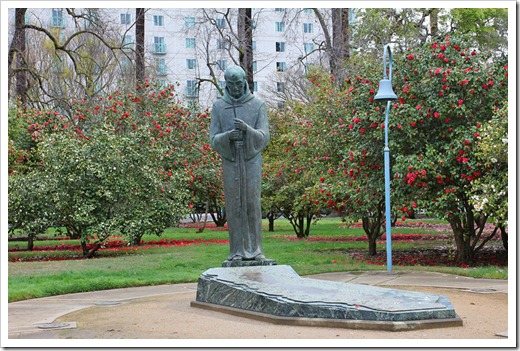 |
| Statue of Father Junipero Serra. In typical revisionist fashion the plaque describes him as “the first Franciscan missionary to whom California owes an everlasting tribute—he brought civilization to our land and in deed and character deserves a foremost place in the history of our State.” |
The carpets of fallen flowers underneath and around the trees were a magic sight.
Here are some of the varieties I found particularly beautiful. Unfortunately, I have no idea what they’re called.
I came across this heart of camellia blossoms on the edge of the Pioneer Camellia Grove. Clearly a romantic at work!
Check out part 2 of this post: Other treasures I found in Capitol Park, including a bunya-bunya.
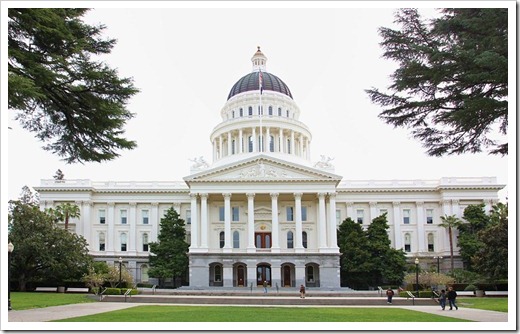

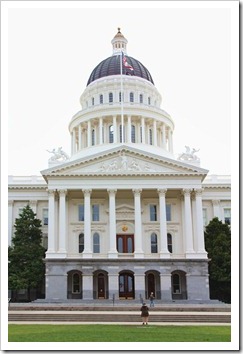

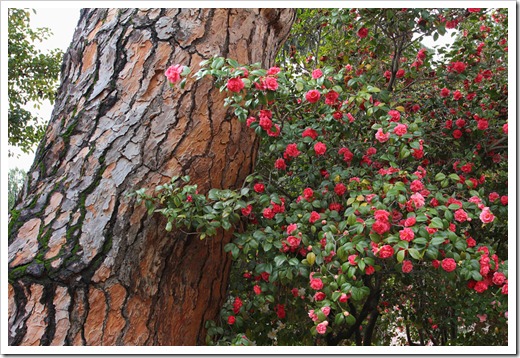









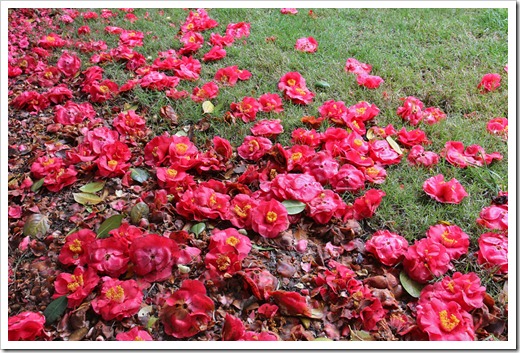



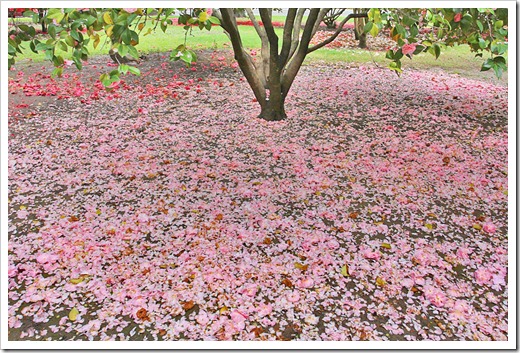







Lovely Camellias! One of the first ones to bloom in the spring, even before flowering cherries in here at least. Camellias had its heyday here before but it seems to be coming back into fashion again.
ReplyDeleteI was surprised to see so many camellias in local nurseries this year. I think they're making a comeback here, too. I'd certainly plant a camellia or two if I had room. Our neighbor has a red one right by her front door, and it looks stunning right now.
DeleteWe are so lucky to have such beautiful camellia's in our city! You are the energizer bunny! You are everywhere! Great photos!
ReplyDeleteI'm going to make more of an effort to take in the local sights. We have a lot of beautiful places right in our area.
DeleteI've just stumbled on this post (looking back on your recent posts) and I am totally in awe of this garden. The Camellias are really amazing - I have never seen such beautiful specimens. Absolutely beautiful, thanks for sharing this.
ReplyDelete